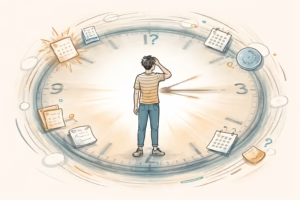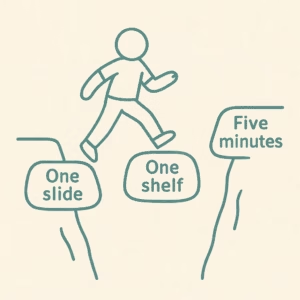For many neurodivergent individuals, especially those with ADHD, unexpected changes can feel like a derailment. A cancelled appointment, a last-minute meeting, or even a traffic jam can send the day spiralling into stress. While some people adjust quickly, for others these surprises overload the executive function of cognitive flexibility—the brain’s ability to shift gears and adapt.
But here’s the key: coping with change doesn’t have to mean “just go with the flow.” Instead, it’s about creating strategies that let you bend without breaking.
Why Shifts and Surprises Feel So Hard
- Executive Function Demands – Change forces the brain to stop, re-plan, and redirect energy. For ADHD, this sudden shift is like rebooting a computer mid-task.
- Emotional Intensity – Unexpected changes can spark frustration, disappointment, or even panic when routines are disrupted.
- Time Blindness – Without clear anchors, shifting a schedule can feel like losing the whole day.
- Loss of Control – Many people rely on structure to feel safe; when plans shift, that safety net frays.
Everyday Signs of Struggle
- Feeling “frozen” after an unexpected request.
- Difficulty re-focusing on a new plan.
- Irritability or anxiety when routines are disrupted.
- Avoidance of flexible planning because surprises feel exhausting.
Gentle, Practical Strategies
1. Build Flexible Routines
Think of your daily plan as a framework, not a rigid script. Create anchor points—like meals, check-ins, or movement breaks—so small changes don’t unravel the whole day.
2. Create “Plan B Baskets”
Prepare alternative activities or backup tasks you can switch to when your original plan changes. For example, if a meeting is cancelled, your basket might include sending follow-up emails or tackling a small admin task.
3. Use Transition Aids
When plans change suddenly, allow a short reset moment—a timer, a few deep breaths, or stepping outside—before diving into the new plan. This pause creates a smoother mental shift.
4. Name the Feeling, Not Just the Change
Acknowledging frustration or disappointment helps regulate emotions. Saying, “I feel thrown off, but I can still do the next step” validates your reaction without letting it control the day.
5. Practise Controlled Flexibility
Start with small, intentional variations in routine (e.g., taking a different walking route). Practising minor shifts makes bigger surprises less overwhelming.
Coaching Perspective
Coaching around cognitive flexibility often involves breaking down surprises into manageable, reframable events. Instead of “My day is ruined,” the focus shifts to “This hour is different, but the whole day isn’t lost.”
On Executive Functions section, we explore how adaptability connects with other skills like planning, time management, and emotional regulation. A change in plans is not just a disruption—it’s a chance to practise resilience in real time.
When Change Feels Unbearable
Sometimes, shifts in plans trigger such strong emotional reactions that functioning feels impossible. In these cases, professional support—whether through ADHD coaching, therapy, or workplace adjustments—can help build tailored strategies. Organisations such as ADHD UK and ADDitude Magazine also provide accessible resources on building daily resilience.
The Takeaway
Coping with change isn’t about becoming endlessly flexible. It’s about creating enough structure that you can bend without snapping. By preparing small fallback strategies and practising gentle adaptability, surprises become less of a derailment and more of a detour you can handle.




